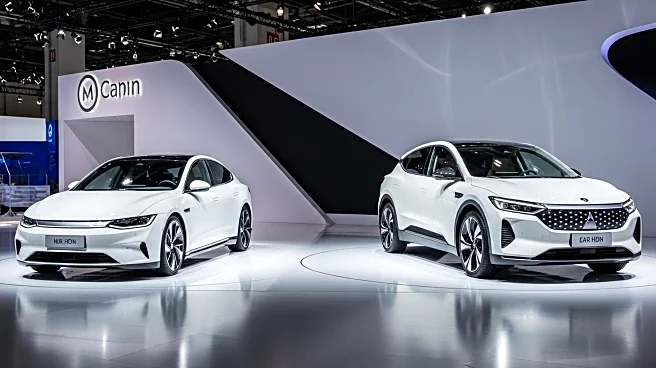What's Happening?
Suzuki Motor Corporation is set to showcase a range of new electric and hydrogen-powered vehicles at the Japan Mobility Show 2025. The exhibition will feature concept models such as the Vision e-Sky BEV minicar, e-VanVan BEV motorcycle, and the hydrogen engine Burgman. Suzuki aims to expand carbon-neutral options through flexible fuel vehicles and compressed biomethane gas technology. The company is also introducing new models like the e-VITARA and GSX-8T, highlighting its commitment to innovative and environmentally friendly transportation solutions.
Why It's Important?
Suzuki's focus on electric and hydrogen vehicles underscores the automotive industry's shift towards sustainable mobility solutions. By expanding its lineup of eco-friendly vehicles, Suzuki is positioning itself as a leader in the transition to carbon neutrality. The introduction of flexible fuel vehicles and compressed biomethane gas technology reflects a multi-pathway approach to reducing emissions. This strategy not only aligns with global environmental goals but also caters to diverse consumer needs, potentially driving increased adoption of green technologies.
What's Next?
Suzuki plans to commercialize the Vision e-Sky BEV minicar by FY2026, targeting consumers who use minicars for daily transportation. The company is also working on developing hydrogen engines and flexible fuel vehicles to offer more sustainable options. As Suzuki continues to innovate, it may influence other automakers to adopt similar strategies, accelerating the industry's shift towards carbon-neutral technologies. The success of these initiatives could lead to further advancements in electric and hydrogen vehicle technology.
Beyond the Headlines
Suzuki's exhibition at the Japan Mobility Show highlights the growing importance of sustainable transportation solutions in the automotive industry. The company's focus on diverse eco-friendly technologies reflects a broader trend towards innovation and environmental responsibility. As automakers increasingly prioritize sustainability, consumers may benefit from a wider range of options that cater to different needs and preferences. This shift could lead to long-term changes in consumer behavior and industry standards, promoting a more sustainable future.









